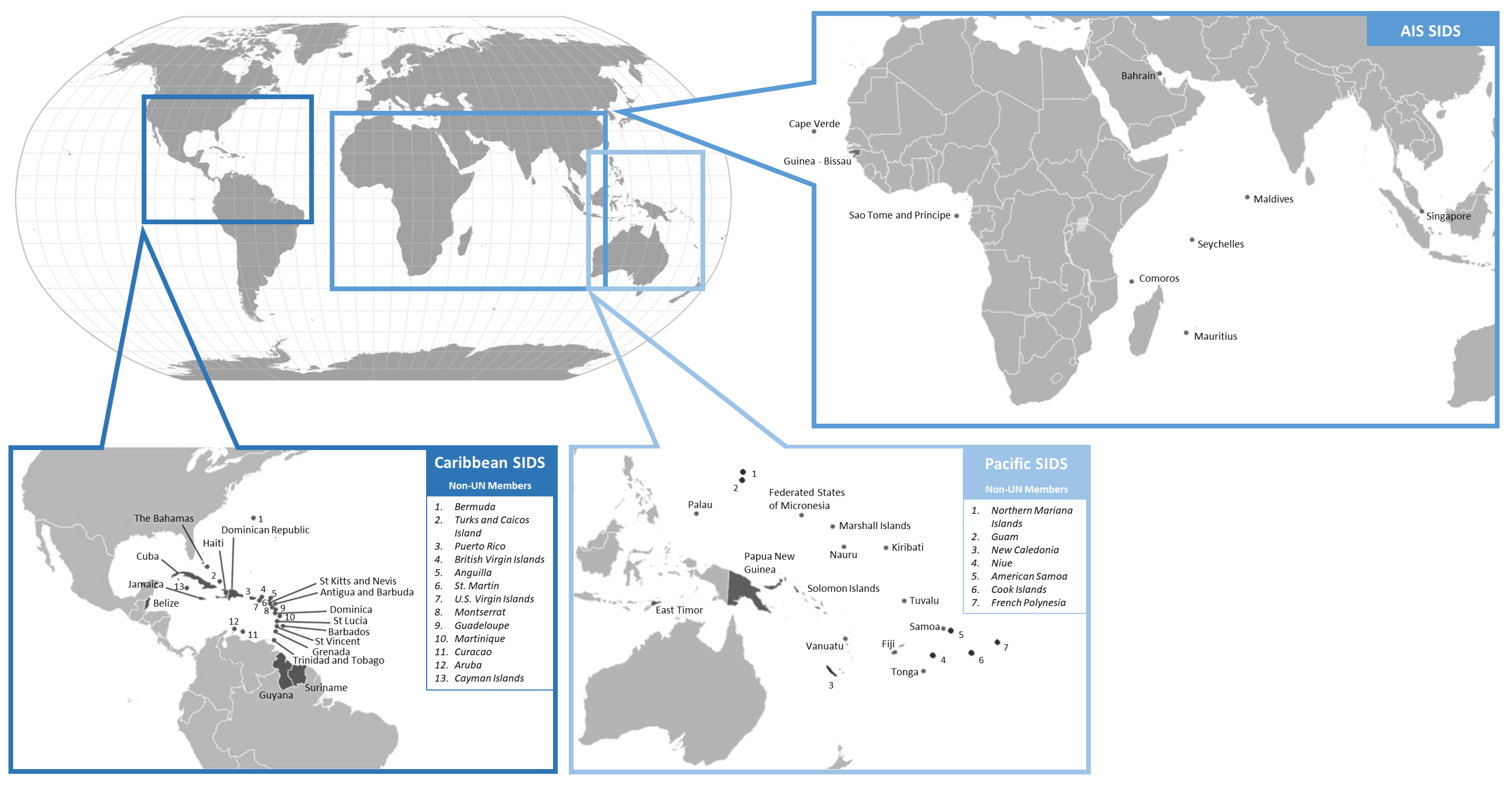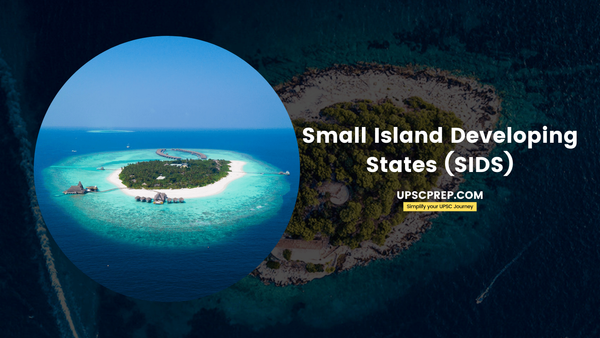Table of contents
What is SIDS?
Small Island Developing States (SIDS) are a distinct group of 39 States and 18 Associate Members of United Nations regional commissions that face unique social, economic and environmental vulnerabilities.

- These SIDS are dispersed across three main geographical regions: the Caribbean, the Pacific, the Atlantic, the Indian Ocean, and the South China Sea.
The upcoming fourth International Conference on SIDS (SIDS4) from May 27 to 30 in St John’s, Antigua and Barbuda, under the theme “Charting the course toward resilient prosperity.”
It aims to evaluate and enhance the sustainable development of these nations, including their progress towards the 2030 Agenda and Sustainable Development Goals (SDGs).
Recognition and Importance
SIDS was recognized as a special environmental and development case at the 1992 United Nations Conference on Environment and Development (UNCED) in Rio de Janeiro, Brazil.
This recognition underscores the unique challenges faced by SIDS, which is home to an aggregate population of approximately 65 million people.
SIDS4 Conference: Objectives and Goals
The SIDS4 Conference will focus on:
- Evaluating progress and identifying challenges in achieving sustainable development.
- Enhancing the resilience of SIDS against environmental and economic shocks.
- Strengthening cooperation among SIDS and with international partners.
- Promoting innovative solutions for sustainable development.

Challenges
Geographic Isolation
- Many SIDS are geographically remote, leading to high import and export costs and irregular international traffic volumes.
- Their economic activities are often constrained by a narrow resource base, necessitating reliance on external markets.

Biodiversity and Natural Resources
- Biodiversity is crucial for the livelihoods of SIDS, with industries like tourism and fisheries often constituting over half of their GDP.
- Biodiversity also holds aesthetic and cultural significance, providing benefits such as food supply, clean water, reduced beach erosion, soil and sand formation, and protection from storm surges.
Impact of the COVID-19 Pandemic
- The COVID-19 pandemic has severely impacted SIDS, particularly those dependent on tourism.
- Global lockdowns have led to significant economic setbacks, hindering efforts to invest in the Sustainable Development Goals (SDGs).
Impact of Climate Change on SIDS

Existential Threats
- Climate change poses a severe existential threat to SIDS.
- Rising sea levels, increased frequency of extreme weather events, and changing climate patterns are significant concerns.
For instance, Tuvalu’s Foreign Minister Simon Kofe, during the 2022 UN Climate Change Conference (COP27), highlighted the imminent danger of rising sea levels, which could submerge the nation by the end of this century.

To preserve its cultural heritage, Tuvalu plans to create a digital replica of its islands in the Metaverse.
Economic Impacts
- Tourism is a major economic driver for many SIDS, contributing significantly to their GDP and exports. Climate change adversely affects tourism through:
- Extreme Weather Events: Hurricanes, floods, and storms damage tourism infrastructure like hotels, airports, and recreational facilities. This reduces the attractiveness of destinations and impacts activities like diving and snorkelling.
- Sea-Level Rise: In Mauritius, for example, sea levels have risen significantly, causing beach erosion, which threatens the tourism industry contributing over 30% to the GDP.
- Operational Risks: Resort economies often rely on fossil fuels for energy, making them susceptible to disruptions during extreme weather events.
- Food and Agriculture: Climate change affects agriculture and fisheries, leading to:
- Altered Precipitation Patterns: Changes in rainfall and temperature impact crop yields and livestock production, leading to food shortages and price hikes.
- Marine Ecosystems: Changes in ocean temperature and acidity affect fish populations, crucial for SIDS relying on fisheries.
- Dependency on Imports: Countries like the Bahamas, which import most of their food, face economic vulnerabilities exacerbated by climate extremes.
- Infrastructure Losses: Climate change can cause significant damage to infrastructure, including:
- Coastal Erosion: Rising sea levels and storm surges lead to the loss of land and property. In Nuatambu, Solomon Islands, nearly half the houses have been lost to rising sea levels.
- Critical Infrastructure: Ports like Port Louis in Mauritius face combined risks from climate change, affecting the import and export of goods and services.

- Exclusive Economic Zones (EEZs)
- The exclusive economic zone (EEZ) of SIDS is, on average, 28 times the size of their land area, making ocean resources critical for their economies.
- However, managing and protecting these vast maritime areas present significant challenges.
- GDP Loss: Climate change can severely impact the GDP of SIDS through:
- Reduced Agricultural Productivity: Extreme weather conditions disrupt agricultural output.
- Tourism Disruptions: Damage to tourism infrastructure and reduced tourist arrivals.
- Increased Healthcare Costs: Higher prevalence of climate-related diseases.
- Economic Instability: Climate-induced migration and social instability.
A study by the Asian Development Bank (ADB) predicts substantial economic losses for SIDS, with Papua New Guinea potentially losing up to 15.2% of its GDP by 2100.
Strategies and Adaptations
- Innovative Solutions
- Floating Cities: The Maldives is constructing the world's first floating city to combat rising sea levels.
- Migration Policies: Kiribati’s "migration with dignity” policy aims to equip its citizens with skills to relocate and find employment abroad.


- Building Resilience
- Protected Areas: SIDS are increasing the percentage of protected marine and terrestrial areas to conserve biodiversity and natural resources.
- Sustainable Practices: Promoting renewable energy and sustainable tourism practices to reduce dependency on fossil fuels.
- International Cooperation SIDS are active in international forums such as
- The UNFCCC COP
- Global Environment Facility (GEF)
- Regional organizations advocate for climate action and secure financial and technical support. Like:
- The Pacific Islands Forum (PIF)
- The Caribbean Community (CARICOM)
- The Indian Ocean Commission (IOC)
These organizations play a crucial role in advocating for SIDS' interests and facilitating cooperation and support.
Conclusion
Small Island Developing States are at the forefront of the global fight against climate change and biodiversity loss. Despite numerous challenges, these nations continue to strive for sustainable development and resilience. The upcoming SIDS4 Conference is a vital opportunity to assess progress and chart a path toward a more resilient and prosperous future for these unique and vulnerable states.
